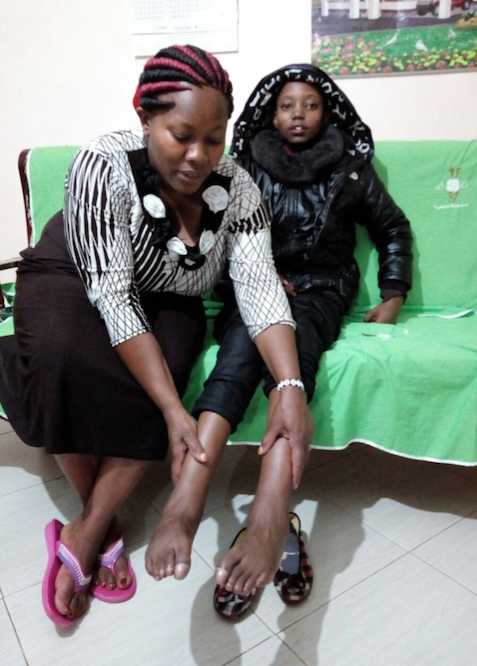‘’I am looking forward to the day I will be a neurosurgeon. I want to treat ailing children’’ It is the valor of a roaring soul battling liver disease. The one that refuses to be beaten even in the face of debilitating illness.
When Jane Wachuka, 14, says she wants to be a neurosurgeon she is talking of a future so uncertain, you can see and feel the pain by looking at her.
She has liver disease.
I make it to their house around 1pm.
The Nakuru sun is scorching. Jane looks fatigued. She has layers of clothing that veil her frail frame.
She is shivering. Cold in the sweltering heat. It is one of the symptoms of liver disease.
So much is expected of this child. The normal cycles of life for instance. School. She is a standard eight pupil at Mugwathi primary school in Wanyororo A in the outskirts of Nakuru town.
It is a routine that doesn’t know that she is battling hypertension and idiopathic chronic liver disease.
This frail looking body has waged this battle since she was 7 months.
She is a fighter. Jane fights with all the arsenal she can find including the layers of clothing that shield her from the cold that sometimes only she feels.
“Kindly, would you help me with an extra sweater’’ She calls out to her mother. She wants to be warm enough as she writes her English examination paper.
Her battles have a way of remedying a painful journey.
She is sitting for her Kenya Certificate of Primary Education (KCPE) this year.
In between losing concentration because the disease is taking too much from her, Jane musters enough energy to go for extra classes with her teachers so that she catch up on various subjects that she misses out on.
She is training her eyes on becoming a neurosurgeon. Her dream has some level of clarity that many can only dream of. She tells me, she wants to be part of a research team to find better treatment to various ailments that affect nervous system.
“This condition sometimes deprives me my happiness, but it has not killed my vision.”
”I am looking forward for a day I will be a neurosurgeon and treat ailing children,” Her optimism is defiant.
The mother explains that Jane developed symptoms that included pale skin, loss of appetite, yellowing of eyes, and general body weakness- whereas most children make baby steps at 1, Wachuka walked at the age of three years.
“My daughters growth was slow,nand she wasn’t breastfeeding as expected. She also had a protruding stomach that someone could easily think she was suffering from malnutrition,” recalls the mother.
Wairimu took her daughter to the Rift Valley Provincial General Hospital, and an ultrasound conducted indicated she had enlarged liver. She was referred to Kenyatta National Hospital.
When biopsies were done in 2004 and 2006 at the national hospital, they revealed that she liver cirrhosis. The doctor who observed her advised use of drugs to manage the condition.
According to the mother, the doctor said at twelve years, there was the possibility that her condition would improve.
It hasn’t. in fact, her liver is getting smaller. Her lungs are affected too.
The KCPE candidate has further developed arthritis, and ulcers that causes her to bleed more often.
The mother sometimes puts Jane’s feet in hot water for ten minutes and then in cold for another ten minutes. I ask what that is about.
“Nobody has told me to dip my daughters’ feet in hot and cold water, and later massage her. I do so, anticipating that she will feel better,” There is a level of desperation in her voice. An inner voice calling out for solutions.
Dr Juliana Muiva Gitobu, a gastroenterologist at Kenyatta National Hospital who has been treating the candidate has advised for an urgent liver transplant in India to save her life.
Saving Jane’s life comes at a cost of Sh7 million. The parents need to raise that amount to be able to take her for a liver transplant in India.
In a letter written by Dr Gitobu, Jane has been going for follow-ups in the gastroenterology clinic at KNH.
“Liver biopsies done in 2004 and 2006 showed liver cirrhosis. Since then, she has been stable. However, we recently reviewed her in our clinic and found her to have features of decompensated liver disease including jaundice, ascites, edema and cyanosis. Her liver function tests now remain elevated,” reads a section of a letter written by the gastroenterologist.
The doctor recommends an urgent liver transplant.
“This letter is to kindly request you to assist the family procure a liver transplant, out of this country as this procedure cannot be carried out in this country,” adds the letter written and signed by the doctor.
Ministry of health has also certified Jane’s travel to Fortis Memorial Research Institute, Gurgaon India for treatment
Jane’s father Geoffrey Warui Karanja has volunteered to be a live donor, as he remains optimistic that the process will be a success. He has met three people who healed after undergoing a successful liver transplant.
“The doctor has advised for a quick transplant, an exercise that she has maintained cannot be undertaken in the country,” says the father.
I see the optimism of parents willing to give life to a child they are watching get consumed by disease.
Jane’s mother is a primary school teacher. Her father is a tour guide.
Karanja has visited various organisations that help with needy medical cases. Unfortunately, they do not support patients who seek treatment outside the country.
The haemorrhaging health sector may just be the one that lets him down. While plans are underway to set up liver-transplant unit at KNH, those who need it now have to make the pilgrimage to another country that does. Often, for most Kenyans, that country is India.
There is a sense of loss as I leave, wondering what is left of Jane, the 14 year old girl who will become a neurosurgeon, if she survives this liver disease that is taking so much of her.











